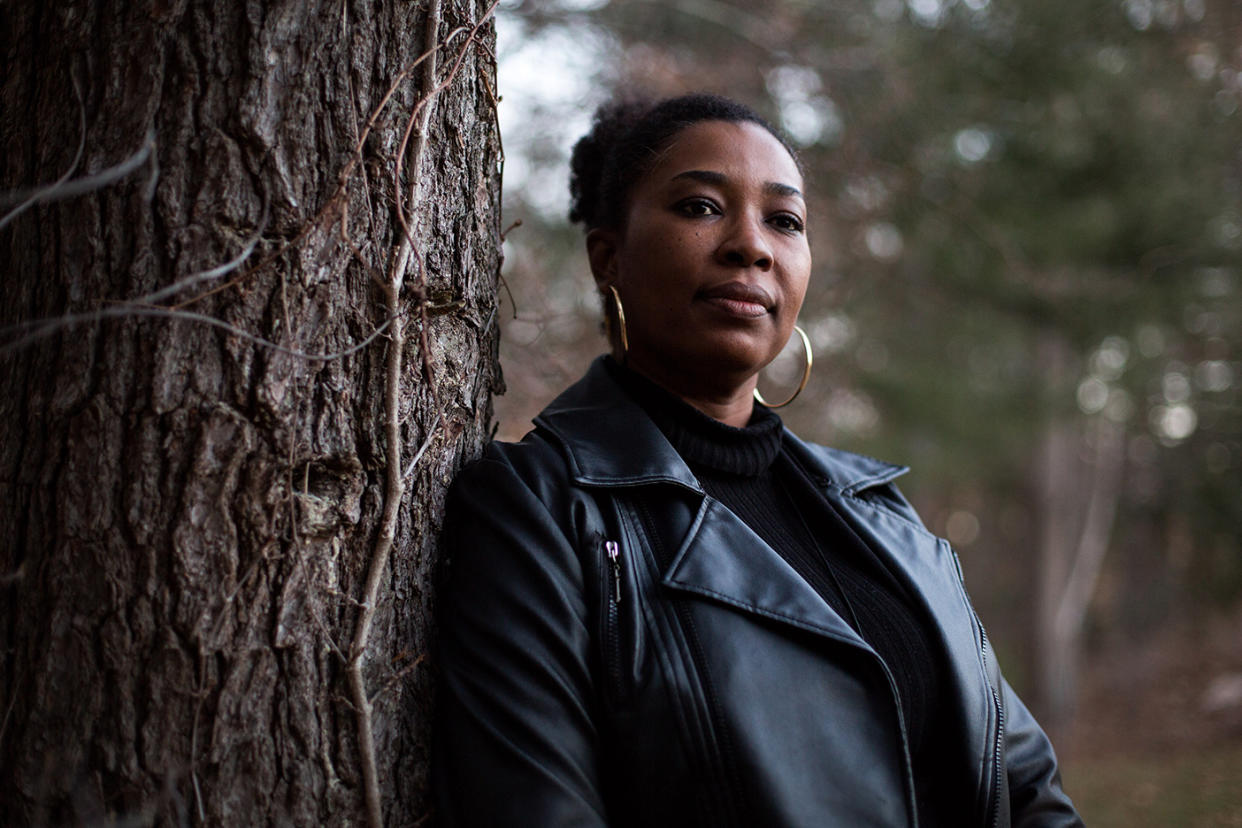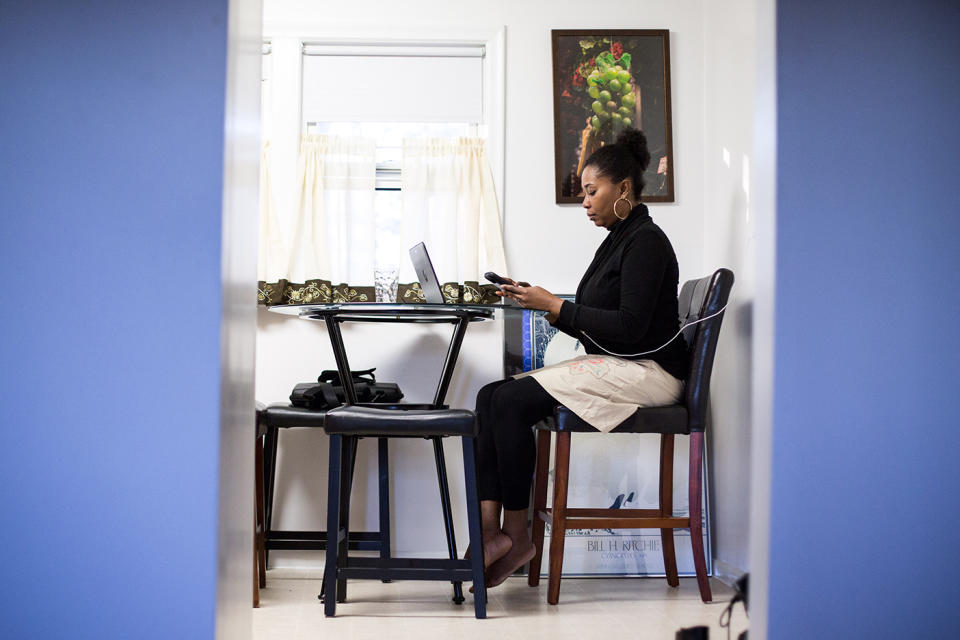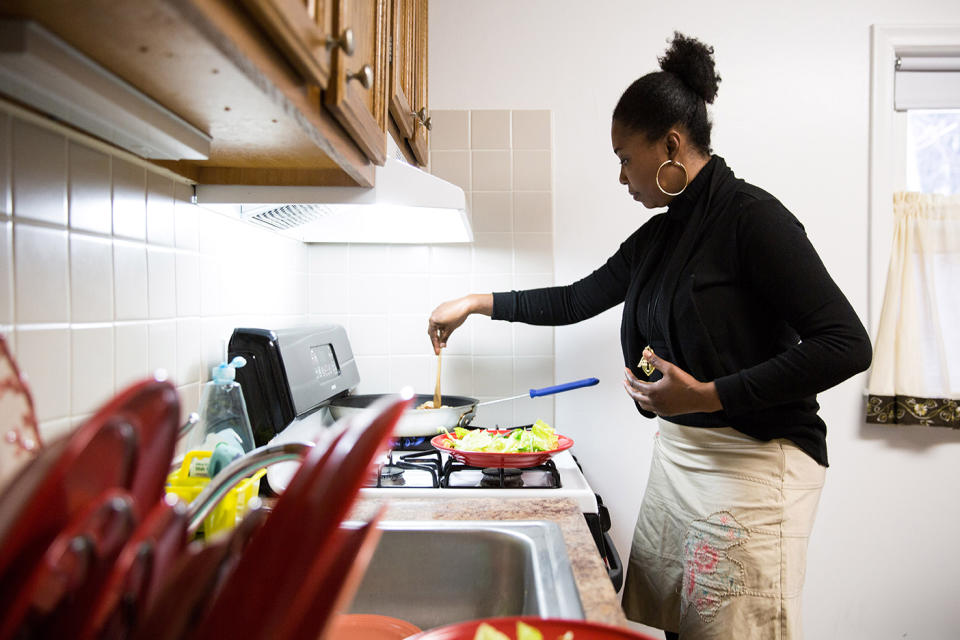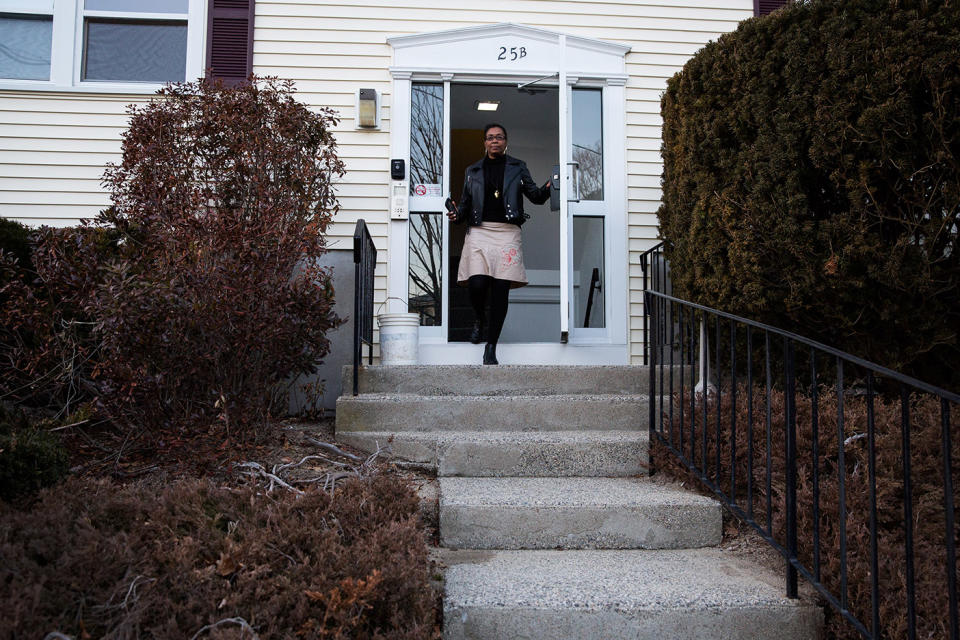Time is running out for Haitian women and girls in U.S. as refugees

“I’m a fighter,” Mona Pompilus says, sitting at her dining table in her comfortable two-bedroom apartment, 3 miles from Gillette Stadium in Foxborough, Mass. Fresh faced with her hair tied back, she wears a black tank top that bares her long arms. “I fight silently, take you by surprise.”
The 43-year-old single mother never saw herself leaving Haiti, but says, “Struggle is my name.”
She spent seven years building her dream house in Haiti before the 2010 earthquake shook it apart. For two months, she cooked, showered, and slept in her backyard alongside 25 people, many of whom she barely knew.
“I had my job, but I didn’t have my house.” Her employer supplied gasoline for her to get to and from work, but the roads were almost unusable, she says. Living amid the rubble were displaced people, many severely injured but with nowhere to turn for help. The constant aftershocks kept everyone on guard, Pompilus says. “You had to keep your kids inside.” But there was a risk being trapped inside of what remained of her house if she made the wrong move.
Nights were cold and days brought inescapable heat. Pompilus worried about the rashes her 7-year-old son developed from the extreme weather changes, rashes she had arranged treatment for years ago. After a few months, when a friend offered them shelter in the U.S., she says, she had no choice but to accept.
That decision may have saved her and her son’s life but also left her in what is now a precarious situation. Along with about 59,000 other Haitian refugees, she is in the United States on temporary protected status, which the Trump administration plans to terminate for Haiti on July 22, 2019. Unless she can navigate an increasingly hostile immigration system to win permanent residency, or the administration offers to extend the deadline for the program, she will be sent back to a country still recovering from multiple disasters and that is dangerously unsafe for women, especially single women.

When she arrived in Boston, Pompilus and her son shared a twin bed in a walk-in closet in her friend’s apartment before Pompilus had enough money saved to get her own place. Within months of her arrival, she began seeing a psychologist for posttraumatic stress disorder. Every night for two years, she slept with her bedroom door wide open and awoke around 2 a.m., shaking. Pompilus says her therapist was not too concerned about her mental health. “ ‘You just need time,’ ” she said her doctor advised.
Two years ago, she found herself in standstill traffic headed south on I-93 to Boston. It was 3 p.m. on a Friday. She had been making house calls as a case manager for Tempus Unlimited, an agency that promotes self-sufficiency for disabled adults and children. When she was on her way back to the office, she felt the bridge deck vibrate. She flung open the car door and was ready to run when she realized no one else was fleeing. “It was the first time I realized I wasn’t healed, that all those things were not behind me.”
Pompilus was leaving work when the 2010 earthquake struck Haiti. She worked for a mall and was enrolled in marketing classes to qualify for a promotion. But that Tuesday afternoon, she decided to skip class and head home. Later she discovered the school had collapsed and left two dead and many injured. Her phone rang nonstop with calls from worried friends and family members. Her older brother had suffered a fracture when cement blocks fell on his head.
“How can you prepare yourself for the end?” Pompilus asks eight years after the earthquake. She tries not to think about abandoning another home, job, and life in 18 months.
If left with no choice but to return home to Haiti’s capital, Port-au-Prince, in 2019, her plan is to return to Haiti, find shelter with a friend, and get a job to save up for a house, temporarily leaving her 15-year-old son with a family friend in the U.S. But she is also seeking to become a permanent U.S. resident. “I would fight to defend my case,” Pompilus says. She has already met with pro bono immigration lawyers to weigh her options.

Pompilus’s urgency was sparked by President Trump’s insensitive comments, she says. In January, on the anniversary of the 2010 earthquake, Trump referred to Haiti, El Salvador, and African countries as “s***hole” countries in a meeting with lawmakers to discuss a bipartisan immigration deal protecting immigrants from deportation. “[The remark] was hurtful, but it was a wake-up call,” says Pompilus. Before the temporary protected status termination announcement, Donald Trump reportedly commented that Haitian immigrants “all have AIDS,” referring to the 15,000 people who received U.S. visas in 2017. On Jan. 18, the Trump administration barred Haitians from qualifying for U.S. visas designated for low-skilled workers.
Slideshow: After Trump’s comments, a look back at Haiti’s devastating 2010 earthquake >>>
“The U.S. gave us an opportunity, a humanitarian favor,” Pompilus says. “How can you say it’s time for me to go back when the same problem that brought me here still exists?” Temporary protected status is designated for noncitizens from countries with persisting, life-threatening circumstances. Haiti is still rebuilding from the 2010 earthquake and the 52 aftershocks, and has suffered a deadly cholera outbreak and a destructive hurricane in 2016.
But under Trump, the Department of Homeland Security has determined that refugees from Haiti will no longer need temporary protected status. According to a Homeland Security press release, then-Acting Secretary Elaine Duke “determined that the extraordinary but temporary conditions caused by the 2010 earthquake no longer exist.” Prior to the announcement, Duke met with Haitian government leaders to discuss the issue and conducted a review of the conditions that originally engendered Haiti’s protected status designation. The review, as summarized in a by the U.S. Citizenship and Immigration Services, included a successful presidential election in February 2017, the closing of 98 percent of displacement sites, and the withdrawal of United Nations peacekeeping mission, “noting the mission had achieved its goals.” As a result of this “progress,” after July 22, 2019, Haitians will have to return to Haiti or be subject to detention and deportation.

But Pompilus does not think her need for protection is over or will be in a year and a half. “Being a woman or girl in Haiti right now is still difficult,” said Amanda Klasing, a senior researcher of the Human Rights Watch Women’s Rights Division. “Gender equality is lacking. The efforts by women and girls have been destabilized, and the institutions aren’t in place to ensure that the vast majority of Haitian women and girls are protected against violence.” In Haiti, where rape was not even a crime until 2005, natural disasters exacerbated the dangers to women and girls. More than 250 rape cases in displacement camps were reported in the first 150 days following the earthquake. Last October, United Nations peacekeepers ended their 13-year-long relief effort in Haiti after they were accused of running a child sex ring earlier last year.
Teenage girls who reported sexual abuse indicated school was one of most common places for harassment. More than a quarter of young women ages 18 to 24 who had been paid for sex as minors said they had been solicited at school. If they are not in school — nearly 4,000 schools were damaged or destroyed by the earthquake — girls are domestic workers, restavèks. In Haiti, 300,000 children are restavèks, mostly girls, some as young as 5. These child laborers are sent from poor families to work for wealthier ones. Often, they are uneducated, unpaid, and physically or sexually abused.
The termination of protected status for protected Haitians would send women — and their children, an estimated 27,000 US citizens — to a country that cannot protect them. “The criminal code is not prepared to address violence against women,” says Klasing. “There’s no comprehensive law against gender-based violence.”
In Haiti, Pompilus had worked for a foreign ministry. She says she clashed with a male supervisor who had hired his girlfriend to work in their office. Gradually, she was stripped of responsibilities she had held for over four years. She did not file a complaint. “When you go to [your boss], you compromise yourself,” says Pompilus. She was fired from her job via a letter stating her boss had “terminated” her. When a human resources representative asked her why she had been let go, but she had no explanation. “There are two ways to be an employed woman in Haiti — to fight and lose or succumb and become prey,” Pompilus says. When I asked her which option she chose, she replied, “I lost my job.”
Haitian women face workplace discrimination and sexual harassment at alarming rates. Nearly three-quarters of female workers experience harassment,according to a study by Heartland Alliance International (“A Barrier to Work, Life, and Rights: Sexual Harassment in Haiti”). Two-thirds of working women have been pressured to have sex with employers to keep their jobs. Women who report sexual harassment risk facing retaliation or a social stigma, leaving gender-based violence in Haiti largely underreported.

“All these factors make it a difficult picture for what women will go back to,” says Nicole Phillips, staff attorney at the Institute for Justice and Democracy in Haiti. Philips receives three to four sexual abuse cases a week from Port-au-Prince. There is culture of impunity for perpetrators, but accountability is growing with the help of human rights and women’s groups. “Progress is being made, but it is slow and steady,” says Phillips. “The influx of people could be a setback.”
Pompilus has no intention of returning to Haiti just yet. “Reality is reality,” says Pompilus. “The country is not prepared for us.” But she is not holding out hope that the termination of the program will be revoked, either. She wants more time to be ready for what comes next.
_____
Read more from Yahoo News:



